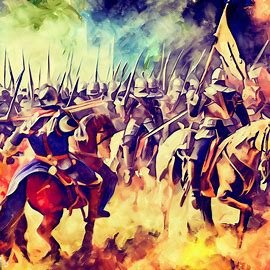Key Battle of the 100 Years War
The Hundred Years' War was a prolonged and complex conflict between England and France that spanned from 1337 to 1453. Lasting over a century, this war witnessed a series of battles, sieges, and diplomatic maneuvers. From the legendary English victory at Crécy to the inspiring triumph of Joan of Arc at Orléans, join us on a captivating journey through time. Discover the strategic brilliance, heroic acts, and profound impact of these key battles that shaped the destinies of England and France, leaving an indelible mark on European history.
Fought on June 24, 1340, in the English Channel, this naval battle was a crucial early victory for the English, demonstrating their naval superiority and weakening French sea power.
This was one of the first major battles of the war. The English, led by Edward III and his son Edward, the Black Prince, achieved a decisive victory over the French. The battle demonstrated the effectiveness of the English longbow against the French cavalry.
Battle of Neville's Cross (1346)
This battle, fought on October 17, 1346, in northern England, was an English victory against the Scots and served to secure their northern border.
The English, commanded by the Black Prince, defeated a larger French army led by King John II of France. The French king was captured and taken as a prisoner to England, which resulted in a temporary cessation of hostilities.
Taking place in 1372 during the conflict known as the "Chevauchée of Edward of Woodstock," this naval battle resulted in an English victory against the French fleet, securing the English Channel for the English navy.
Occurring on November 27, 1382, in Flanders, this battle saw the English and their Flemish allies defeat the rebellious citizens of Ghent, further asserting English influence in the region.
In one of the most famous battles of the war, the English, led by King Henry V, achieved a resounding victory over the French. The English longbow once again played a crucial role, resulting in heavy casualties for the French.
Fought on August 17, 1424, in northern France, this battle was a significant English victory against the combined forces of France and Scotland.
This siege was a turning point in the war and marked the rise of Joan of Arc. The French, inspired by Joan's leadership, successfully defended the city of Orléans against the English, leading to a series of French victories
Occurring on June 18, 1429, this battle followed the Siege of Orléans and marked another victory for the French forces led by Joan of Arc. The battle significantly weakened the English position in France.
Fought on April 15, 1450, in northern France, this battle was a major victory for the French. It led to the recapture of Normandy from the English and significantly diminished their territorial holdings in France.
The final battle of the war took place in Gascony. The French, led by Charles VII's general Jean Bureau, defeated the English, effectively ending their military presence in France.












